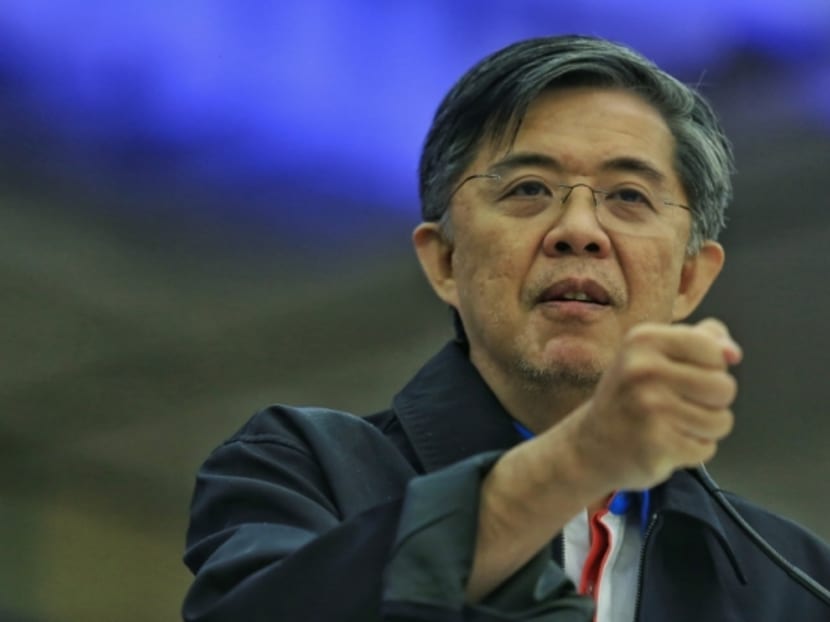Two Pakatan pacts in GE14? Possible, as PKR mulls returning to 1990
KUALA LUMPUR — Parti Keadilan Rakyat (PKR) is considering the possibility of the opposition contesting the next general election as two separate alliances, like the now-defunct Angkatan Perpaduan Ummah (APU) and Gagasan Rakyat (GR) pacts in 1990 when Parti Islam Se-Malaysia (PAS) and the Democratic Action Party (DAP) were in separate coalitions, PKR vice-president Chua Tian Chang said.

PKR’s Chua Tian Chang says his party will still continue talks with the DAP and PAS before deciding whether to opt for two separate opposition pacts or ― ideally ― a single unified front. Photo: Malay Mail Online
KUALA LUMPUR — Parti Keadilan Rakyat (PKR) is considering the possibility of the opposition contesting the next general election as two separate alliances, like the now-defunct Angkatan Perpaduan Ummah (APU) and Gagasan Rakyat (GR) pacts in 1990 when Parti Islam Se-Malaysia (PAS) and the Democratic Action Party (DAP) were in separate coalitions, PKR vice-president Chua Tian Chang said.
He said that back in Election 1990, PAS and the DAP contested in APU and GR respectively, with Semangat 46 led by former United Malays National Organisation (UMNO) vice-president Tengku Razaleigh Hamzah in both alliances, because the Islamist and the secular parties believed that they would lose voter support if they were in the same coalition.
“But we’ve proven that it won’t,” Mr Chua, better known as Tian Chua, told Malay Mail Online yesterday (Nov 30).
“Keadilan (PKR) has to find a creative way of achieving some form of one-to-one fight. The option of what Tengku Razaleigh did can be one reference,” the Batu member of parliament (MP) added.
The recent annual meetings of PKR and the DAP showed the former restating its commitment to cooperating with PAS, while the latter held up PAS splinter group Amanah as its Islamist ally of choice for Pakatan Harapan.
PAS, PKR, and DAP were previously in the Pakatan Rakyat (PR) pact that DAP declared dead following disagreements with PAS, but which the Islamist party insists was still functional with both it and PKR the remaining members.
The existence or otherwise of PR and its successor, Pakatan Harapan, is further muddied by the fact that neither is a formally registered entity and prevails only so far as the member parties agree that it does.
Mr Chua said in the event both PR and Pakatan Harapan contest the 14th general election, the political parties in both alliances would still combine to form the government if they won the majority of seats.
“It’ll be illogical to imagine DAP saying, ‘We’re so principled, we’re not going to have PAS in the government’. So it’ll eventually mean that we’ll have PAS in the government,” he said.
Mr Chua stressed that PKR would still continue talks with the DAP and PAS before deciding whether to opt for two separate opposition pacts or ideally a single unified front.
“If we leave it laissez faire, there’ll be multi-cornered fights. DAP will prove ‘We have some Malays and can make it in Malay areas’; Amanah will want Malay areas. Come to non-Malays, DAP and Keadilan both are multi-racial. PAS also will jump in and say ‘We have our supporters’ club that has Chinese and Indians’. That would be even more messy,” he said.
In the 1990 election in their fight against Barisan Nasional (BN), APU had focused on the predominantly Malay east coast, while GR contested in the west coast and urban seats.
The conflict between PAS and the DAP then over the former’s insistence on creating an Islamic state resurfaced this year and led to the eventual break up of PR, despite the gains made in Election 2008 and 2013.
Pakatan Harapan was then formed comprising PKR, the DAP and Amanah, which was established by progressive former PAS members who left the Islamist party after a bitter internal election.
DAP national political education director Liew Chin Tong said, however, his party was unlikely to pursue the 1990 APU and GR model, pointing out that the current scenario was “entirely different”.
“There are overlap of seats not so much between DAP and PAS, which is still very much minimal; there are overlap of seats between Amanah and PAS, as well as between PKR and PAS,” Mr Liew told Malay Mail Online.
“PKR won’t be able to repeat S46’s feat because if PKR sits idle in between PAS and Amanah too often, PKR will be the first injured by the fights between the two,” he added.
When pointed to Amanah’s fledgling status compared to PAS that was formed in 1951, Mr Liew said PKR and the DAP had been new parties in the 1999 and 1969 elections, respectively, but still managed to win seats before going on to be major forces in local politics.
Mr Liew stressed that what is needed is an opposition coalition with a “clear sense of purpose and direction”.
Political analyst Wan Saiful Wan Jan from the Institute for Democracy and Economic Affairs (IDEAS) said the case of APU and GR has shown it is possible for political parties to cooperate even if they are not in a formal coalition.
“If they prioritise taking over the country’s administration, then I am sure they will find a way to cooperate,” Mr Wan Saiful told Malay Mail Online.
“But if they insist on squabbling among themselves, then we might not see the cooperation. Voters will want to see how united the opposition parties are before deciding whether or not to trust them with Putrajaya,” the IDEAS chief executive added. MALAY MAIL ONLINE






